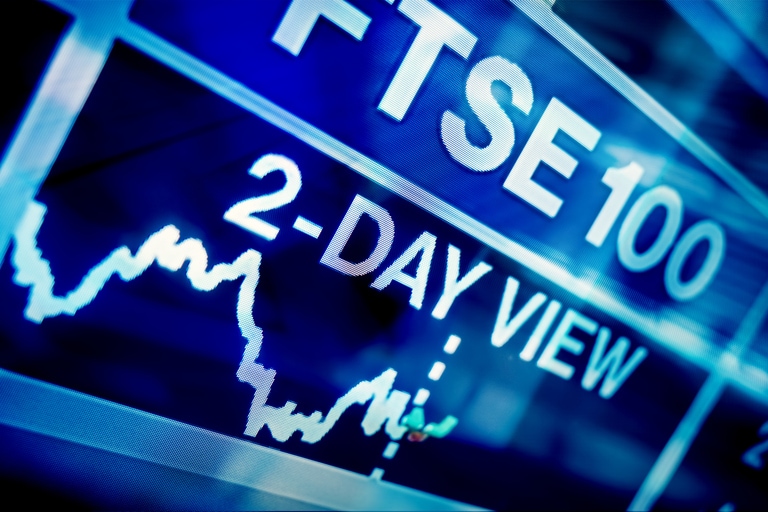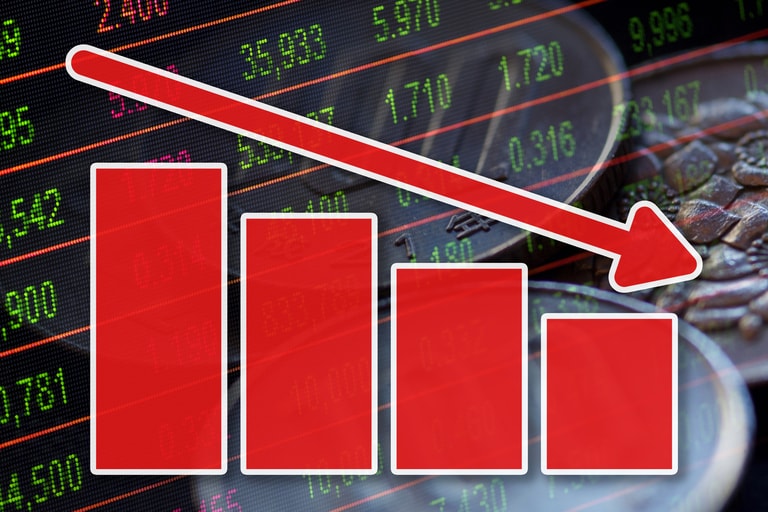On Friday we can expect to hear more about “sticky” inflation following the February reading of the US core personal consumption expenditures price index, and the eurozone’s preliminary estimate of consumer price inflation in March. UK retail will also be in the spotlight this week, with Next and Ocado each set to announce their latest earnings.
Our top three economic and company events in order of importance this week are:
1. Friday – US core PCE price index (February)
The Fed's favourite inflation gauge, the core personal consumption expenditures (PCE) price index, unexpectedly increased 4.7% in the year to January, up from 4.6% in December, fuelling the debate about the “stickiness” or persistence of high inflation. Amid concerns over financial stability and the negative effects of higher interest rates, the Fed will be hoping that price growth soon begins to ease again.
The jump in inflation sent the US two-year Treasury yield up to 5% this month, though it has since slipped back below 4% due to fears over the banking system. In fact, the two-year yield is set to post its biggest monthly fall since the 2008 financial crisis. With monthly growth in personal spending expected to have slowed from January’s 1.8%, the big question is whether core PCE also fell.
2. Friday – eurozone flash CPI (March)
As expected the European Central Bank raised its benchmark deposit rate by 50 basis points to 3% this month. Despite the banking turmoil that has seen UBS absorb its rival Credit Suisse, ECB policymakers felt compelled to go ahead with the planned rate hike as core inflation rose to a fresh high of 5.6% in February. That said, headline inflation has been coming down, falling to 8.5% in February from 8.6% in January and from 9.2% in December.
Nevertheless, policymakers have become more hawkish in their efforts to curb rising prices, even if this month’s meeting placed greater emphasis on responding to the data and monitoring “how the situation unfolds” ahead of further rate decisions. It’s unclear precisely which data the ECB was referring to, raising the question of whether core CPI or financial stability is the uppermost concern.
3. Wednesday – Next full-year results
When Next issued a trading statement in early January the shares reacted positively, climbing above 6,600p. They have since spent most of this quarter pushing up to the 7,000p mark, recently hitting their highest level for 12 months. According to the January statement, full-price sales grew 4.8% in the nine weeks to 30 December. This led the clothing and homeware retailer to increase its full-year profit before tax guidance by £20m to £860m.
Somewhat surprisingly, given the travel disruption at the end of last year, Next’s retail division saw full-price sales rise by 12.5% over the period, while the online division contributed a mere 0.2% gain. Offering its outlook for the year to January 2024, Next said it expects full-price sales to drop 1.5%, and profit before tax to fall 7.6% to £795m. Cost price inflation is expected to peak at 8% in the summer, before slipping back to 6% in the second half of the year.
More key events
Our calendar of other notable economic and company events:
Monday 27 March
Carnival Q1 results
The cruise industry, like most areas of the travel sector, has had a difficult three years. After a modest stabilisation in the Carnival share price in 2021, the shares continued to struggle due to the stop-start nature of the recovery in overseas travel. Over the last 12 months, the shares plunged again, hitting a 30-year low back in October. Since then, early indications suggest the stock may have found a short-term base, having more than doubling from those lows.
In Q4 Carnival posted a smaller-than-expected loss of $0.85 a share, even as revenue fell short of expectations. Investors appeared to be encouraged by a more optimistic outlook for the upcoming financial year. Carnival said at the time it expected Q1 capacity to grow 3.7% and losses to halve to around $800m. There still remains a long way to go, however. In 2019, the last year before the pandemic, annual revenue was $20.8bn. Last year revenue came in at $12.17bn. The hope is that 2023 will be the year that annual revenue returns to 2019 levels. Expectations are for revenue to rise to $20.99bn.
Tuesday 28 March
Ocado Group Q1 results
Since Ocado posted its full-year numbers at the end of February, the shares have come under further pressure. The stock is down roughly 27% in the last month, with investors apparently concerned over the company’s ability to grow revenue as it spends money on new deals.
Full-year group revenue came in flat last year at just over £2.5bn, while revenue in its core retail business declined 3.8% to £2.2bn. The group’s loss widened to £500.8m from £176.9m last year. The retail business was responsible for the bulk of the miss as it posted an EBITDA loss of £4m compared to a £150.4m profit a year ago.
The company blamed higher costs, smaller basket sizes in its joint venture with Marks & Spencer, and the expansion of its technology solutions business. US partner Kroger’s announcement that it would not be opening more fulfilment centres in 2023 is likely to have added to the pressure on Ocado shares.
John Wood Group full-year results
The last few weeks have brought quite a bit of volatility for shares of John Wood Group as the Aberdeen-based oilfield services and engineering company has become the target of private equity fund Apollo Capital Management. Apollo has made four bids for Wood over the past few weeks, all of which have been rejected. The latest bid valued the company at 237p a share.
In January, Wood expected full-year revenue to come in at $5.4bn and adjusted EBITDA to range from $375m to $385m, in line with previous guidance. The company also factored in a $15m impact from exchange rate movements. The company had an order book of $6bn, and expected order growth in 2023 to be in the mid- to high-single digits. Guidance for 2023 is expected to be in line with previous medium-term financial targets.
Walgreens Boots Alliance Q2 results
When Walgreens reported its Q1 numbers at the start of the year, the shares slipped back, and have continued to decline from the 6-month peaks seen during December. Q1 revenues came in at $33.38bn, due to an increase in demand for cough and flu medicine. Profits came in at $1.16c a share. Despite this Walgreens posted an unadjusted loss of $3.7bn due to a provision of $5.2bn of in relation to litigation the company was required to pay for opioid related litigation after several US states alleged the retailer mishandled prescriptions by overprescribing. Q2 profits are expected to come in at $1.10c a share.
Micron Technology Q2 results
Micron Technology has been one of the more stable tech stocks in recent months, finding support at $48 and meeting resistance at $64. In Q1 Micron reported a loss of $0.04 a share on lower-than-expected revenue of $4.1bn.
The computer data storage company said it would cut its headcount by 10% during 2023 and suspend staff bonuses. Micron added that it expected to incur a $30m charge related to the restructuring, and forecast a Q2 loss of $0.62 a share on revenue of $3.8bn.
Wednesday 29 March
Next full-year results
See our top three events, above
Thursday 30 March
US Q4 GDP
The final reading of the US’ fourth-quarter gross domestic product is expected to see growth revised upwards to 2.8% from the previous estimate of 2.7%. That would represent a modest slowdown from 3.2% in Q3. Given how weak consumer spending was at the end of last year, it is perhaps surprising that the US economy held up as well as it did in Q4.
The fall in personal consumption from 2.3% to 1.4% wasn’t a surprise. The surprise was that it didn’t fall further. However, this is likely to be offset by a rebound in retail sales in January.
Friday 31 March
US core PCE price index (February)
See our top three events, above
Eurozone flash CPI (March)
See our top three events, above
UK Q4 GDP
The final estimate of Britain’s Q4 gross domestic product is expected to confirm that there was no growth during the quarter. This means that the UK economy avoided a technical recession in Q4, after economic output shrank 0.2% in Q3.
The previous estimate suggested that the economy stagnated in Q4. A rebound in consumer spending during the World Cup in Qatar helped lift the numbers. Recent retail updates indicate that consumers are still spending, albeit more cautiously, and the construction sector is also showing signs of increased activity.
Business investment rebounded in Q4 after a slowdown in Q3. Although the country may have avoided a recession for now, the economic outlook remains challenging with headline inflation running at 10.4% and consumer confidence still fragile.
INDEX DIVIDEND SCHEDULE
Dividend payments from an index's constituent shares can affect your trading account. View this week's index dividend schedule.
SELECTED COMPANY RESULTS
| MONDAY 27 MARCH | RESULTS |
| Carnival Corp. (US) | Q1 |
| Dialight (UK) | Full-year |
| TUESDAY 28 MARCH | RESULTS |
| AG Barr (UK) | Full-year |
| Bellway (UK) | Half-year |
| CPP Group (UK) | Full-year |
| John Wood Group (UK) | Full-year |
| Micron Technology (US) | Q2 |
| Ocado Group (UK) | Q1 |
| Walgreens Boots Alliance (US) | Q2 |
| WEDNESDAY 29 MARCH | RESULTS |
| Next (UK) | Full-year |
| Paychex (US) | Q3 |
| THURSDAY 30 MARCH | RESULTS |
| Braze (US) | Q4 |
| Canoo Inc. (US) | Q4 |
| Cazoo Group (US) | Q4 |
| Chesnara (UK) | Full-year |
| FRIDAY 31 MARCH | RESULTS |
| Vanquis Banking Group (UK) | Full-year |
| Verb Technology Company (US) | Q4 |
Note: While we check all dates carefully to ensure that they are correct at the time of writing, company announcements are subject to change.
Disclaimer: CMC Markets is an execution-only service provider. The material (whether or not it states any opinions) is for general information purposes only, and does not take into account your personal circumstances or objectives. Nothing in this material is (or should be considered to be) financial, investment or other advice on which reliance should be placed. No opinion given in the material constitutes a recommendation by CMC Markets or the author that any particular investment, security, transaction or investment strategy is suitable for any specific person. The material has not been prepared in accordance with legal requirements designed to promote the independence of investment research. Although we are not specifically prevented from dealing before providing this material, we do not seek to take advantage of the material prior to its dissemination.







